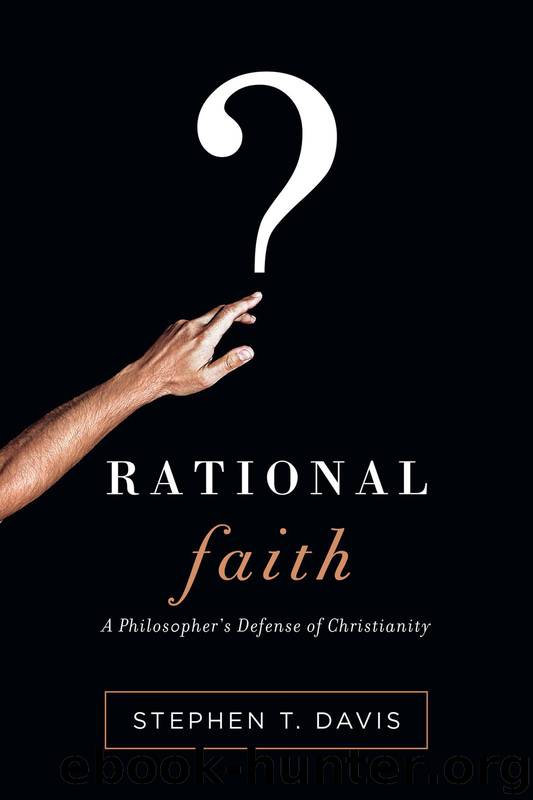Rational Faith: A Philosopher's Defense of Christianity (Veritas Books) by Davis Stephen T

Author:Davis, Stephen T. [Davis, Stephen T.]
Language: eng
Format: azw3
Publisher: InterVarsity Press
Published: 2016-11-02T16:00:00+00:00
Why Are People Religious?
It is clear that religious beliefs and practices are extraordinarily widespread among human beings. They are found in all cultures and nations and periods of history. Religion seems easy to acquire and to transmit to others; Homo sapiens is sometimes called Homo religious. This is not to say that religion is universal; there are irreligious people and largely secular communities in the world (e.g., communities of intellectual and cultural elites in contemporary Europe and North America).
But why are the vast majority of people religious? Why do people need and practice religion? Lots of possibilities have been suggested. Is it in order to understand the universe and our place in it? Or is it to try to escape misfortune in life? Or is it to assuage our sense of guilt? Or is it to provide some sort of meaning in life? Or is it to assure us of survival of death? Or is it more than one or all of these? Whatever the reason or reasons, it seems that religious belief among human beings, while certainly avoidable, is largely both easy and explainable. In those senses it does seem to me natural to believe in some sort of God, gods or supernatural forces. (I will return to why I think certain actual religions, especially Christianity, are not natural in these senses.)
There is a strange phenomenon in the neighborhood.10 With the third sense of natural in mind, it seems that on most topics (excluding, perhaps, religion and politics) sensible people who disagree can usually understand and appreciate the position of the other person, maybe even the evidence or arguments of the other person, even though they may disagree strongly. But here the situation is different. Nonbelievers often hold that beliefs like “God exists” or “God created the universe” are irrational. They have a hard time understanding how any sensible person could believe such claims. But the reverse is true too: many religious believers (theists, anyway) will insist that such claims are clearly true; their experience (or purported experience) of God is such that they have a hard time understanding how any sensible person could deny these claims.
It is even the case that religious believers and nonbelievers occasionally offer interesting explanations of the behavior of people in the other group. Religious folk can suggest that nonbelievers are blinded by pride, self-interest and their own sinfulness; they do not want God to exist, so they deny that God exists. And skeptics can argue that religious people are rendered naive and credulous by their powerful need to believe in a loving and avuncular heavenly Father who cares for them and will reward them with eternal life. That is why they believe.
Both these arguments, if taken to be refutations of the positions being commented on, are fallacious. You cannot refute a belief B by arguing—even correctly arguing—that B is caused by x.
Nevertheless, let’s think about this last point for a bit. Religious believers do sometimes express puzzlement at religious unbelief. Christians among them
Download
This site does not store any files on its server. We only index and link to content provided by other sites. Please contact the content providers to delete copyright contents if any and email us, we'll remove relevant links or contents immediately.
The Secret Power of Speaking God's Word by Joyce Meyer(3184)
Signature in the Cell: DNA and the Evidence for Intelligent Design by Stephen C. Meyer(3132)
Real Sex by Lauren F. Winner(3014)
The Holy Spirit by Billy Graham(2944)
The Gnostic Gospels by Pagels Elaine(2527)
Jesus by Paul Johnson(2352)
Devil, The by Almond Philip C(2325)
23:27 by H. L. Roberts(2248)
The Nativity by Geza Vermes(2227)
Chosen by God by R. C. Sproul(2161)
All Things New by John Eldredge(2160)
Angels of God: The Bible, the Church and the Heavenly Hosts by Mike Aquilina(1959)
The Return of the Gods by Erich von Daniken(1943)
Angels by Billy Graham(1922)
Knowing God by J.I. Packer(1854)
Jesus of Nazareth by Joseph Ratzinger(1811)
The Gnostic Gospel of St. Thomas by Tau Malachi(1794)
Evidence of the Afterlife by Jeffrey Long(1786)
How To Be Born Again by Billy Graham(1778)
